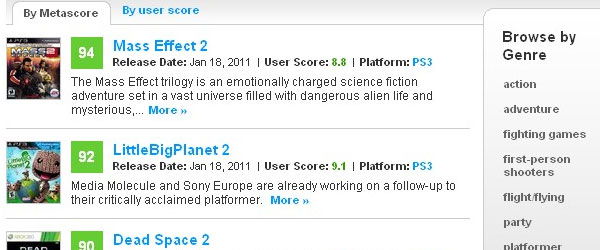Welcome to the ZTGD Reviewer Rodeo. Each week, we’ll grab on to the hottest issue, hold on for dear life, and wrassle it to the ground.
Do review scores matter and what impact do they have on the community with regard to purchase decisions or attitudes about a title?
John “Dubya” Whitehouse
In all honesty, I can’t see reviews scores making that much difference to someone’s purchase choice. Most people have already decided before hand if they want to buy a game. For example, I have pre-ordered Gears of War 3 and I will be hitting a midnight launch to get it. I don’t care what the review scores look like.
However, I do think that for some games a review score can either sink it or sell it. Call of Juarez: The Cartel was a game I was looking at maybe getting, but after the barrage of poor reviews it got, I won’t even pick it up now for £25.

It may be a cliché, but some games just don’t really need reviews, as they will sell by the bucketload regardless. Titles like Modern Warfare 3, Uncharted 3, Gears 3, Batman… They will fly off the shelves, but in most cases it is because they have a certain expected level of quality. Does anyone really think that Uncharted 3 will be a bad game?
I do, however, believe that games do still need reviews. There are people introducing themselves to the world of gaming all the time; without reviews they would be stuck for which titles (old or new) to invest in. It can also be great fun reading a review, checking out someone else’s perspective on it and seeing how it may differ from your own. Besides, without reviews, I would be out of a job!
Drew “Frustrated Fury” Leachman
I hate to say it, but it seems like the review score matters more than the actual review. It’s very sad to say, but I believe it’s true. If people deny it, go take a look at Game Rankings or Metacritic. They flourish due to review scores. Even gamers out there will look at a score before reading the review. Don’t ask me why. Maybe its laziness, curiosity, or maybe they just want a game to be summed up in one big score.
I put my heart and soul into my reviews, and it irks me to no ends that most people will look at the score and never actually read my words. As far as if it actually dictates whether or not a game will be purchased, absolutely. The funny thing is, reviews for games are really the only thing that does that, Mainly because you can go see a movie for 8 bucks while going to play a video game can cost you 60 dollars. People need to be reassured of their purchase. Even I can say I don’t buy certain games I’m on the fence about and the scores are low. Even then, I read the review itself and make a decision on my own rather than just looking at a score and saying “yay” or “nay.” The more important thing is making sure you know what the score actually means.
Too many times have I seen a game get a 7.0 out of 10 and people say, “Oh, it must be bad.” Last time I checked, a 5.0 was the middle of the road/average game. 7.0 is a good score in my opinion, but as of the past 10 years, a good game is considered 8.0 or higher. That really gets on my nerves more than anything. I think as far as scores go, people really need to recalculate how they look at them and actually read the review. Not only that, but also learn who exactly is writing the review. Knowing the editor is just as important as knowing the score.

Michael “PaladinXII” Futter
When I was a teenager, I had a rule about seeing movies. I was going anyway, but if the critics hated it, I was going to love it. The reason for this was simple; reviewers weren’t looking for the same thing in films that I was at that point in my life. Over the years, and especially as gaming has become an even bigger part of my life, I’ve learned that reviews are only as valuable as your understanding of the writer.
You’ll notice that, especially here on ZTGD, we’re pretty open about our personal likes and dislikes. That way, you know that if one of our reviewers identifies something that stands out about a game (positive or negative) you’ve got a framework to compare it to your own interests and habits. If we give a AAA game a good score, that isn’t surprising. You might not even read the review to find out what inspired us to assign the accompanying numerical value. However, if you know the reviewer, and he or she hasn’t been a fan of the series in the past or doesn’t play that type of game during their leisure gaming hours, that actually means something (case in point: Ken’s review of Killzone 3).
So, do review scores matter? I think they do; too much, even. The average gamer will look at a score to justify their purchase (or non-purchase). It’s rare that a game with unexpectedly high review scores will see a bump in sales (why haven’t you purchased Shadows of the Damned, by the way?). On the flip side, gamers will flee from an anticipated game that “underperforms” without reading the whole narrative of the reviews. This does a disservice to the developers, the writers and, worst of all, the gamers that make snap decisions based on scores.
Review scores have become a systemic problem that is only made worse by publishers that tie bonuses to Metacritic scores. The industry leans on review scores and, therefore, the consumers follow suit. Aggregate sites normalize even sites that have tried to steer away from numerical scores or have instituted new scales or scoring policies. We can’t get away from them, but we can be smarter about how we factor that number into our perceptions.

Ken “ZeroTolerance” McKown
Ever since I founded ZTGD, I have always been an advocate of review scores, but never without context. It is easy to glare at the giant number on the page and immediately disagree with the reviewer before reading a single word. This is the problem. Not knowing why they gave it that score, or even what that score means to that reviewer, defeats the purpose of looking at it. Every site, and every editor for that matter, works in a different way. I love reviewing games, but sometimes my opinion might not reflect the score you associate my words with, and this is simply because everyone has different factors when coming to the score portion.
My issue with aggregate sites lately is that they separate consoles for reviews. This defeats the purpose of aggregating reviews. While we may review the game on 360, a separate site will review the same game on PS3, have a different scale, and tip the percentage one way when in reality the game is pretty much the same in most cases. If we are going to have a standard, make it across the board. I also don’t agree that bonuses should be tied to these scores. It is all a messy business that I think people just put too much stock into.
My point is that everyone is different. Review scores are necessary and in my opinion benefit gamers because there are so many choices and opinions out there, that you are bound to find the answer to that burning question of whether or not to purchase a game when it comes out. People take scores too personally, and honestly, their interpretation of the scales has to be adjusted. Depending on the site, a 7 is not always the middle ground, and some sites are more enthusiastic than others. Get to know your editors if they give you the chance, and continue to use your common sense and logic to make all purchasing decisions.
That’s all for this edition of the ZTGD Reviewer Rodeo. Join us next week as we grab onto another bucking bronco of controversy and beat it into submission.
Got questions or comments? Drop ’em in the comment section below or hit us up via email. Suggestions for Reviewer Rodeo topics that you want our opinions on? Hit Mike up at michaelfutter@ztgamedomain.com.

Mookie
I think that it is better to read both game score and the review. That way you will understand why the reviewer gave that score and also will give the idea on his/her personality as a reviewer & a gamer.
Ken
Most review scores are not important to me. I use reviews and previews to see if I am going to like the game. A good review or preview will explain game elements and relate it to other games that I may like or dislike. Too many new gamers just look at a score and think anything below an 8 is bad and do not actually read the review. I believe the review without scores and just catchy headlines are the best. Then you have to read the whole review.
vinicius
Very interesting article. BTW, I even preordered Shadows of the Damned, and the early reviews just confirmed my perception of a great, unique title. I’ve found out from my past experiences that I enjoy wacky games that are not your standard pop-corn AAA title.
I believe Metacritic is helpful, but in the end seeing some gameplay is the best way to have an idea of what you’re expecting. And even so, nothing beats experience a game yourself.